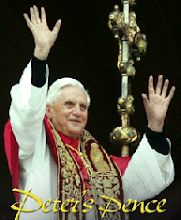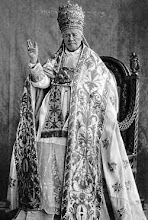A call by Blessed Pope Pius IX for all Protestants and non-Catholics to reject their errors and embrace the truth of the Holy, Roman, Catholic, and Apostolic Church. I think it is important in this day of so much error, to remember that the Catholic Church alone leads men to eternal salvation.-AshleyTO ALL PROTESTANTS AND OTHER NON-CATHOLICS.
Pius IX., Pope.
You all know already that We, having been raised, not withstanding Our unworthiness, to this Chair of Peter, and therefore invested with the supreme government and guardianship of the whole Catholic Church, divinely entrusted to Us by Christ our Lord, have judged it seasonable to call to Us Our Venerable Brethren, the Bishops of the whole earth, and to unite them together, to celebrate, next year, an Ecumenical Council ; so that, in concert with these Our Venerable Brethren who are called to share in Our cares, We may take those steps which may be most opportune and necessary, both to disperse the darkness of the many noxious errors which everywhere increasingly prevail, to the great loss of souls ; and also to establish and confirm daily more and more among the Christian people entrusted to Our watchfulness the Kingdom of true Faith, Justice, and the Peace of God. Confidently relying on the close ties and most loving union which in so marked a way unite to Ourselves and to this Holy See these Our Venerable Brethren, who, through all the time of Our Supreme Pontificate, have never failed to give to Ourselves and this Holy See the clearest tokens of their love and veneration ; We have the firm hope that this Ecumenical Council, summoned by Us at this time, will produce, by the inspirations of Divine Grace, as other General Councils in past ages have done, abundant fruits of benediction, to the greater glory of God, and the eternal salvation of men.
Sustained by this hope, and roused and urged by the love of our Lord Jesus Christ, who gave His life for the whole human race, We cannot refrain Ourselves, the occasion of the future Council, from addressing Our Apostolic and paternal words to all those who, whilst they acknowledge the same Jesus Christ as the Redeemer, and glory in the name of Christian, yet do not profess the true faith of Christ, nor hold to and follow the Communion of the Catholic Church. And We do this to warn, and conjure, and beseech them with all the warmth of Our zeal, and in all charity, to consider and seriously examine whether they follow the path marked out for them by Jesus Christ our Lord, and which leads to Eternal Salvation. No one can deny or doubt that Jesus Christ Himself, in order to apply the fruits of his redemption to all generations of men, built His only Church in this world on Peter ; that is to say, the Church, One, Holy, Catholic, and Apostolic ; and that He gave to it all necessary power, that the deposit of Faith might be preserved whole and in inviolable, and that the same Faith might be taught to all peoples, kindreds, and nations, that through baptism all men might become members of His mystical body, and that the new life of grace, without which no one can ever merit and attain to life eternal, might always be preserved and perfected in them ; and that this same Church, which is His mystical body, might always remain in its own nature firm and immovable to the end of time, that it might flourish, and supply to all its children all the means of Salvation. Now, whoever will carefully examine and reflect upon the condition of the various religious societies, divided among themselves, and separated from the Catholic Church, which, from the days of our Lord Jesus Christ and His Apostles has never ceased to exercise, by its lawful pastors, and still continues to exercise, the divine power committed to it by this same Lord; cannot fail to satisfy himself that neither any one of these societies by itself, nor all of them together, can in any manner constitute and be that One Catholic Church which Christ our Lord built, and established, and willed should continue; and that they cannot in any way be said to be branches or parts of that Church, since they are visibly cut off from Catholic unity. For, whereas such societies are destitute of that living authority established by God, which especially teaches men what is of Faith, and what the rule of morals, and directs and guides them in all those things which pertain to eternal salvation, so they have continually varied in their doctrines, and this change and variation is ceaselessly going on among them. Everyone must perfectly understand, and clearly and evidently see, that such a state of things is directly opposed to the nature of the Church instituted by our Lord Jesus Christ; for in that Church truth must always continue firm and ever inaccessible to all change, as a deposit given to that Church to be guarded in its integrity, for the guardianship of which the presence and aid of the Holy Ghost have been promised to the Church forever. No one, moreover, can be ignorant that from these discordant doctrines and opinions social schisms have arisen, and that these again have given birth to sects and communions without number, which spread them selves continually, to the in creasing injury of Christian and civil society.
Indeed, whoever recognizes religion as the foundation of human society can not but perceive and acknowledge what disastrous effect this division of principles, this opposition, this strife of religious sects among themselves, has had upon civil society, and how powerfully this denial of the authority established by God, to determine the belief of the human mind, and to direct the actions of men as well in private as in social life, has excited, spread, and fostered those deplorable upheavals, those commotions by which almost all peoples are grievously disturbed and afflicted.
Wherefore, let all those who do not hold to the unity and truth of the Catholic Church avail themselves of the opportunity of this Council, whereby the Catholic Church, of which their forefathers were members, displays a fresh proof of her perfect unity and her unconquerable vitality; and let them, in obedience to the longings of their own hearts, be in haste to rescue themselves from a state in which they cannot be assured of their own salvation. And let them not cease to offer most fervent prayers to the God of Mercy, that He may break down the wall of separation, that He may scatter the mists of error, and that He may lead them back to the bosom of Holy Mother Church, where their fathers found the wholesome pastures of life, and in which alone the doctrine of Jesus Christ is preserved and handed down entire, and the mysteries of heavenly grace dispensed.
As for Us, seeing that We ought, in accordance with the duty of Our supreme Apostolic Ministry intrusted to Us by our Lord Jesus Christ Himself, to fulfil with most fervent zeal all the offices of a good Shepherd, and with paternal love to follow and embrace all men throughout all the world We therefore address this Our Letter to all Christians separated from Us, wherein We exhort and entreat them, again and again, to hasten their return to the One Fold of Christ; for with Our whole soul We ardently desire their salvation in Jesus Christ, and We fear lest We may one day have to render an account to the same Lord, who is Our Judge, if We do not, so far as is in Our power, show them, and prepare for them the way to attain to this eternal salvation. Truly, in every prayer of Ours, beseeching and giving thanks, We cease not, day and night, to entreat humbly and earnestly for them, from the Eternal Pastor of souls, the abundance of light and heavenly grace. And since, notwithstanding Our unworthiness, We are His Vicar here upon earth, We therefore wait, with outstretched hands, and with most ardent desire, the return of Our wandering children to the Catholic Church, that We may most lovingly welcome them to the home of their Heavenly Father, and enrich them with his exhaustless treasures. Upon this longed for return to the truth and unity of the Catholic Church depends the salvation not only of individuals, but also of all Christian society; and never can the whole world enjoy true peace, unless there shall be one Fold and one Shepherd.
Given at Rome, in St. Peter's, on the 13th day of September, 1868, and in the year of Our Pontificate the twenty-third.
Taken from:
http://www.archive.org/stream/theinvitationhex00stonuoft/theinvitationhex00stonuoft_djvu.txt





































